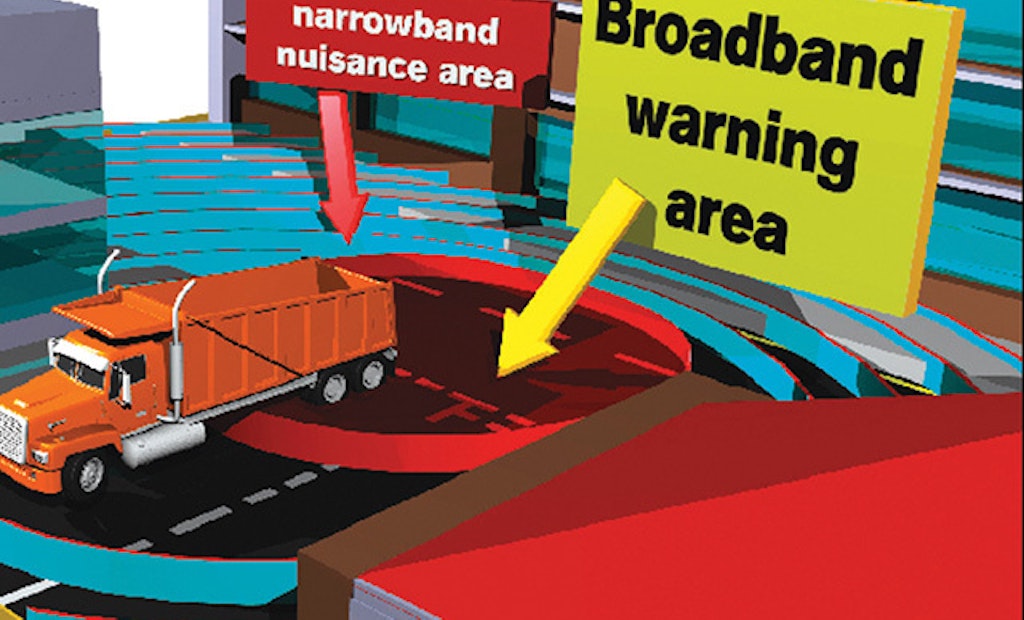
Interested in Safety?
Get Safety articles, news and videos right in your inbox! Sign up now.
Safety + Get AlertsAcross the United States, noise pollution is not just an inconvenience – it is a safety concern and health hazard.
No one can turn the daily noise down with a remote control. The noise barriers between city streets, busy job sites and public spaces have virtually dissolved. A common noise in urban and some rural settings comes from backup alarms on heavy machinery.
Today, technology offers alternatives to these alarms. One such technology replaces the traditional beeping noise with a sound that covers a broad band of frequencies. Workers on the job site can hear the alarm when danger is imminent, yet the sound is largely inaudible outside the work zone.
Community concerns
Many accidents are caused by smaller machines in environments where workers are thought to be most safe. Many involve backing vehicles – their beeper alarms sounding at full volume. These alarms, producing sound in a narrow band of frequencies, have at least three drawbacks:
Those who hear them cannot easily perceive the direction from which the danger is coming.
The sound becomes ineffective because most of the time when people hear it, no danger is imminent (think of the boy crying wolf).
They cause noise pollution.
Additionally, long-term overexposure to narrowband alarm sounds can lead to hearing damage. Alarms also can be irritants to communities and neighborhoods. Growing numbers of cities and villages are adopting noise ordinances to protect not just residential areas but sensitive facilities like schools, hospitals and nursing homes.
A different sound
Where vehicle backup warnings are concerned, broadband alarms have proven effective in reducing noise pollution and enhancing worker safety. These alarms are becoming a viable choice for a wide variety of applications.
The devices are designed to keep the alarm noise on the site, and ensure a fast and appropriate response from those close by. The key words here are locatability and frequency. Broadband sound is more effective at alerting people to imminent danger because the person who hears it can instantly pinpoint the direction of its source.
Yet the sound is heard only in and around the immediate danger area. These multi-frequency alarms span the sound spectrum from 400 Hz to over 10,000 Hz, avoiding the irritation and potential ear damage caused by shrill, narrowband sounds.
A broadband backup alarm makes a repetitive sound, but instead of beeping, it issues a shhhh ... shhhh ... shhhh. One might question whether people on work sites would hear such a sound above the roar of engines and other work site noise. Experience definitively shows they do.
Hear, look, learn
A logical question is whether workers accustomed to beeping alarms would recognize the broadband sound without training. In reality, some organizations use broadband alarms only on controlled sites where workers can be trained. However, most users in the United Kingdom have found that, because the sound is distinctive and its source readily located, workers on first exposure have an instant "hear, look, learn" reaction. The same is true of work site passers-by.
One broadband alarm was professionally recognized by the Society of Automotive Engineers (SAE) with the Noise Management Innovations prize at the 2005 Environmental Excellence in Transportation Awards.
The citation stated, "Broadband sound backup alarms provide a massive reduction in the noise pollution caused by conventional narrowband backup alarms, together with providing a safer working environment."
The wider implications are evident: While narrowband alarms are designed to improve safety, they can actually contribute to danger by causing confusion and stress. In contrast, broadband alarms are locatable and are heard only in and around the immediate danger area. This improves response and reduces noise complaints.
As industries take notice of the benefits of broadband backup alarms, the results could be greater workplace safety and less noise pollution.





